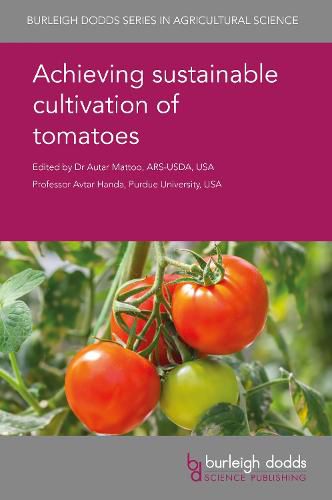Readings Newsletter
Become a Readings Member to make your shopping experience even easier.
Sign in or sign up for free!
You’re not far away from qualifying for FREE standard shipping within Australia
You’ve qualified for FREE standard shipping within Australia
The cart is loading…






Authors have made remarkable efforts to balance background with basic-applied research findings enhancing the understanding of the various issues and techniques involved in tomato production, physiology, breeding and genetics…It is a valuable resource of modern knowledge for research academics and graduate students, and also applicable to consultants and managers involved in tomato R&D, such as those in seed and chemical companies.
Professor Daniel Leskovar in Chronica Horticulturae
Tomatoes are the second most important vegetable crop in the world after potatoes. Originating in South America, they are now grown widely around the world. As the population continues to grow, there is a need to increase yields in the face of such challenges as climate change, threats from pests and diseases and the need to make cultivation more resource-efficient and sustainable.
Drawing on an international range of expertise, this collection focuses on ways of improving the cultivation of tomatoes at each step in the value chain, from breeding to post-harvest storage. The book begins by looking at improvements in cultivation techniques, before moving on to review advances in ensuring genetic diversity, understanding of tomato physiology and breeding techniques. The collection concludes by discussing developments in understanding and managing pests and diseases.
Achieving sustainable cultivation of tomatoes will be a standard reference for horticultural scientists in universities, government and other research centres and companies involved in tomato cultivation.
$9.00 standard shipping within Australia
FREE standard shipping within Australia for orders over $100.00
Express & International shipping calculated at checkout
Authors have made remarkable efforts to balance background with basic-applied research findings enhancing the understanding of the various issues and techniques involved in tomato production, physiology, breeding and genetics…It is a valuable resource of modern knowledge for research academics and graduate students, and also applicable to consultants and managers involved in tomato R&D, such as those in seed and chemical companies.
Professor Daniel Leskovar in Chronica Horticulturae
Tomatoes are the second most important vegetable crop in the world after potatoes. Originating in South America, they are now grown widely around the world. As the population continues to grow, there is a need to increase yields in the face of such challenges as climate change, threats from pests and diseases and the need to make cultivation more resource-efficient and sustainable.
Drawing on an international range of expertise, this collection focuses on ways of improving the cultivation of tomatoes at each step in the value chain, from breeding to post-harvest storage. The book begins by looking at improvements in cultivation techniques, before moving on to review advances in ensuring genetic diversity, understanding of tomato physiology and breeding techniques. The collection concludes by discussing developments in understanding and managing pests and diseases.
Achieving sustainable cultivation of tomatoes will be a standard reference for horticultural scientists in universities, government and other research centres and companies involved in tomato cultivation.